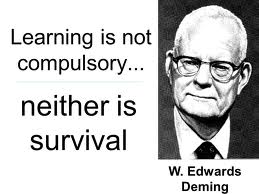This is a post geeking out on the intersection of W. Edwards Deming and our Lean Coffee format. It is brief and assumes some prior knowledge of the System of Profound Knowledge and Deming’s 14 Points. If you don’t know these yet, please go to the sources. Deming’s writings have had a profound influence on the work we do at Modus Cooperandi.
I will now view Lean Coffee through these two Deming lenses:
Lens 1: SoPK:
 The System of Profound Knowledge is an acknowledgement that our work creates and is influenced by systems that, like memes, have life and influences of their own often beyond and independent of their creators’ intent. These systems always have unintended consequences and experience change when exposed to the real work which creates variation during normal operations (things don’t go as planned). When exposed to variation, we see how things are operating and learn, making changes (hopefully) to the system to account for the variation (to adapt to it or to quell it), this is gaining knowledge. While all this is happening, our systems have actors (human beings) which have to interact with and react to our system. These people may react well, helping the system thrive, or react poorly by gaming or ignoring the system, or they may be unable to act at all and become trapped in it. This means their individual psychology influences and is influenced by the system.
The System of Profound Knowledge is an acknowledgement that our work creates and is influenced by systems that, like memes, have life and influences of their own often beyond and independent of their creators’ intent. These systems always have unintended consequences and experience change when exposed to the real work which creates variation during normal operations (things don’t go as planned). When exposed to variation, we see how things are operating and learn, making changes (hopefully) to the system to account for the variation (to adapt to it or to quell it), this is gaining knowledge. While all this is happening, our systems have actors (human beings) which have to interact with and react to our system. These people may react well, helping the system thrive, or react poorly by gaming or ignoring the system, or they may be unable to act at all and become trapped in it. This means their individual psychology influences and is influenced by the system.
When we create systems, we need to take into account that there will be other systems, variation, learning, and other people that combine to create an operational whole.
Lean Coffee is a fairly closed and protected system that encourages variation (diversity) of ideas while defining group value in the service of obtaining knowledge. Participants in a Lean Coffee are encouraged by the system to not only participate but to become active agents in the creation of new ideas (knowledge). Being personally heard, driving conversation (especially for those who usually don’t), and feeling joint ownership of both agenda and product is a psychological win that further strengthens the system and encourages usage, more ideation, and more creation.
Lens 2: The 14 Points:
I will eternally wish there were less than 14 points. 14 is a long list and it’s actually fairly arbitrary. Deming himself was constantly tinkering with it, wordsmithing it, letting it evolve. Since he passed away, it’s remained unchanged. So, I believe as Deming would have wanted, I’m going to treat the 14 Points like they are a thing and not a bunch of things.
In my opinion, the 14 points are an admonishment of Theory X management. They are a tireless list of obvious critical failures of top-down management. The list is not nearly as important as the intent.
So, let’s approach Lean Coffee that way.
Agenda driven meetings and events are Theory X style tools. People believe in command and control and they set up their meetings that way. It’s no wonder people hate meetings.
Like the 14 Points, Lean Coffee starts with the assumption that controlling people is dehumanizing. We pay people a lot of money to work for us. We encourage a lot of people to come to our conferences. Then we treat them like objects, like resources.
Normal meetings and agendas are standards, they are management by objective, they are barriers. Lean Coffee seeks to create meeting agendas that are focused on the needs, the interests, and the wisdom of everyone around the table. This shared focus means a few things:
- Participants are now owners of the process
- Participants are now owners of the product
- Bad actors are quickly dealt with by the group (not struck down by the meeting owner)
- Bad actors are less likely because they will have put their agenda out for a vote and it will or will not have survived
- Meetings become focused on what we can do, not what we need to talk about.

